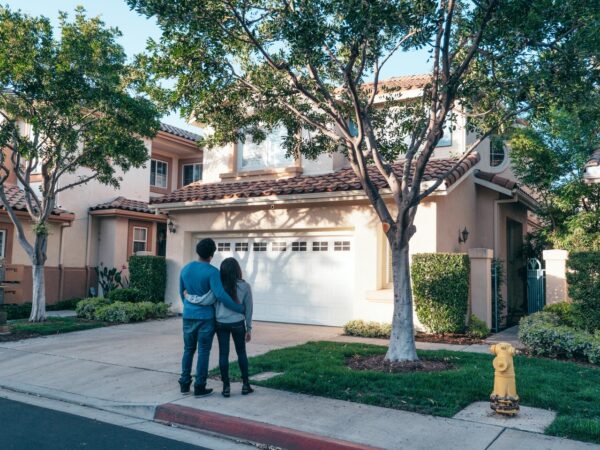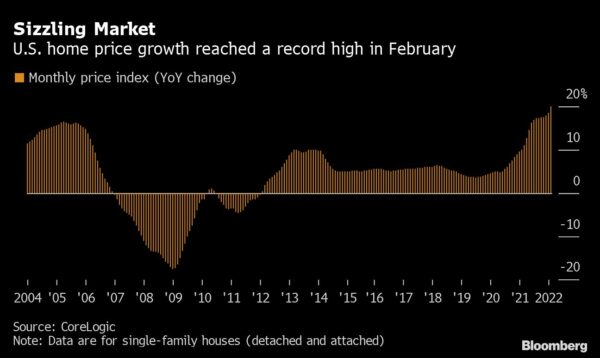
By Prashant Gopal
The affordability window is closing fast for house-hunters in the busiest U.S. sales season. And with inflation rampant, they’re primed to bid high.
Two years into the pandemic housing boom, price gains are only accelerating. Mortgage rates have climbed at the quickest pace in almost three decades. There’s also hardly anything to buy.
People like Mark Kobuszewski are getting desperate. After he got a promotion, he and his wife sold their modest house in New Jersey early this year, dreaming of a future with more space. So far, they’ve lost 11 bidding wars in the Charlotte, North Carolina area — a market crowded with deep-pocketed investors and wealthy out-of-state shoppers paying cash.
“We can’t buy a house,” said Kobuszewski, 39, a regional manager for a security integrator. “We were all excited, now it’s nerve-wracking.”
Spring traditionally ushers in a rush of home transactions in the U.S., but this year, buyers are in an especially precarious spot. They’re under the gun, sprinting to outrun soaring borrowing costs and escalating prices that threaten to sideline them indefinitely. That’s running counter to the Federal Reserve’s efforts to curb inflation and cool the overheated housing market by raising interest rates.
Compounding anxieties, inventory has hovered near record lows for months. That’s partly because homeowners with cheap mortgages are reluctant to list their properties: If they move, they’ll have to get a new, more expensive loan.
But the pandemic buying frenzy’s days may be numbered. It’s just a matter of time before affordability hits a breaking point and buyers start to pull back, said Mark Zandi, chief economist for Moody’s Analytics.
In February, prices jumped 20%, twice as fast as a year earlier and the quickest annual pace in records dating to 1976, data from CoreLogic show. Like many analysts, Zandi expects price growth to slow this year — to about 5%, followed by a decline of 2% by the end of 2023.
“This is the last gasp,” Zandi said. “We are going to see the market freeze up here if rates don’t come back down in the next several months.”
Already, applications to purchase homes with Federal Housing Administration mortgages, a key source of financing for first-time buyers, fell almost 20% last week from a year earlier, according to the Mortgage Bankers Association.
The jump in borrowing costs isn’t trivial. A homeowner with a $300,000 mortgage would pay $1,560 at 4.72%, Freddie Mac’s current average for a 30-year loan. That’s up $277 from the start of the year, when rates were at 3.11%. Many buyers are already getting quotes above 5%.

The risk is that people driven to own a home may be compelled to stretch their budgets beyond what they can comfortably pay. Trouble arises when enough buyers act on the assumption that the current rate of price gains will continue, the Dallas Fed said last week in a report that cited signs of a U.S. housing bubble brewing.
“If many buyers share this belief, purchases arising from a ‘fear of missing out’ can drive up prices and heighten expectations of strong house-price gains,” researchers for the bank wrote.
The Dallas Fed said it isn’t expecting a crash on the order of the one that followed the 2008 financial crisis. But cracks — albeit tiny ones — may be forming.
Last month, the share of U.S. homes with seller price cuts was slightly higher than it was than a year earlier, according to Realtor.com. Inventory plunged, but not quite as much as it had the previous March. Brokerage Redfin Corp. said fewer people are starting online searches, and home tours are below 2021 levels.
Mark Vitner, senior economist at Wells Fargo Securities, expects competition to ease a bit if rates for the average for 30-year loans crosses above 5%. But the flood of investors and people moving from high-cost states to more-affordable ones will keep prices rising even if some shoppers are forced to step back.
“Investors have been overpaying for homes because they are able to raise capital so much cheaper,” Vitner said.
Prices also will continue climbing as long as inventory stays tight, according to Vitner. The shortage is building on itself because homeowners who would typically move are staying put instead.
Take Trish Byce, a North Atlanta real estate agent. While her clients are eager for listings, she herself is reluctant to downsize from the six-bedroom house she shares with two dogs and two cats. For one thing, she’d have to trade her 3% mortgage rate for a pricier loan, and also would pay a hefty premium for anything she found, she said.
“I keep looking around for what’s available to buy and I’m not sure it’s worth it,” said Byce, 68, whose grown daughter recently moved into the garage apartment with her fiance. “I can just sit here in my 6,000-square-foot house and pay this little bit left on my mortgage and be very comfortable.”
Meanwhile, the Kobuszewskis, working with a Redfin agent, recently offered $45,000 more than the asking price for a home in Charlotte, only to be told it was the lowest of nine bids. They tried again last Sunday, making what Mark Kobuszewski considered an aggressive offer on a 2,000-square-foot house listed at $395,000. They lost to a cash buyer who sweetened the deal by agreeing to close in just two weeks.
“What we dreamed of is no longer affordable,” said Kobuszewski, who is stuck for now in a Charlotte rental apartment. “You question, did I make the right move?”
More stories like this are available on bloomberg.com.




